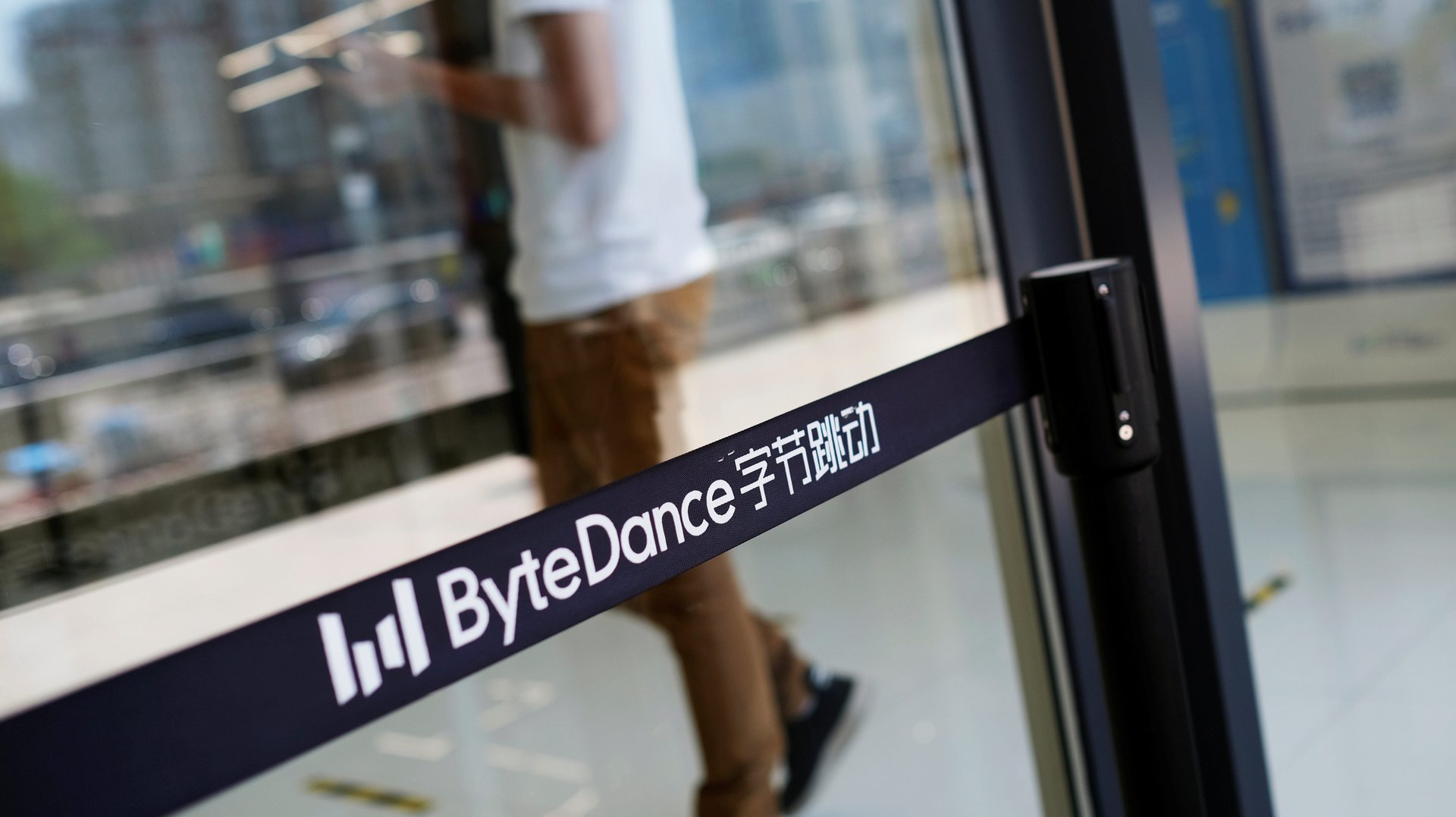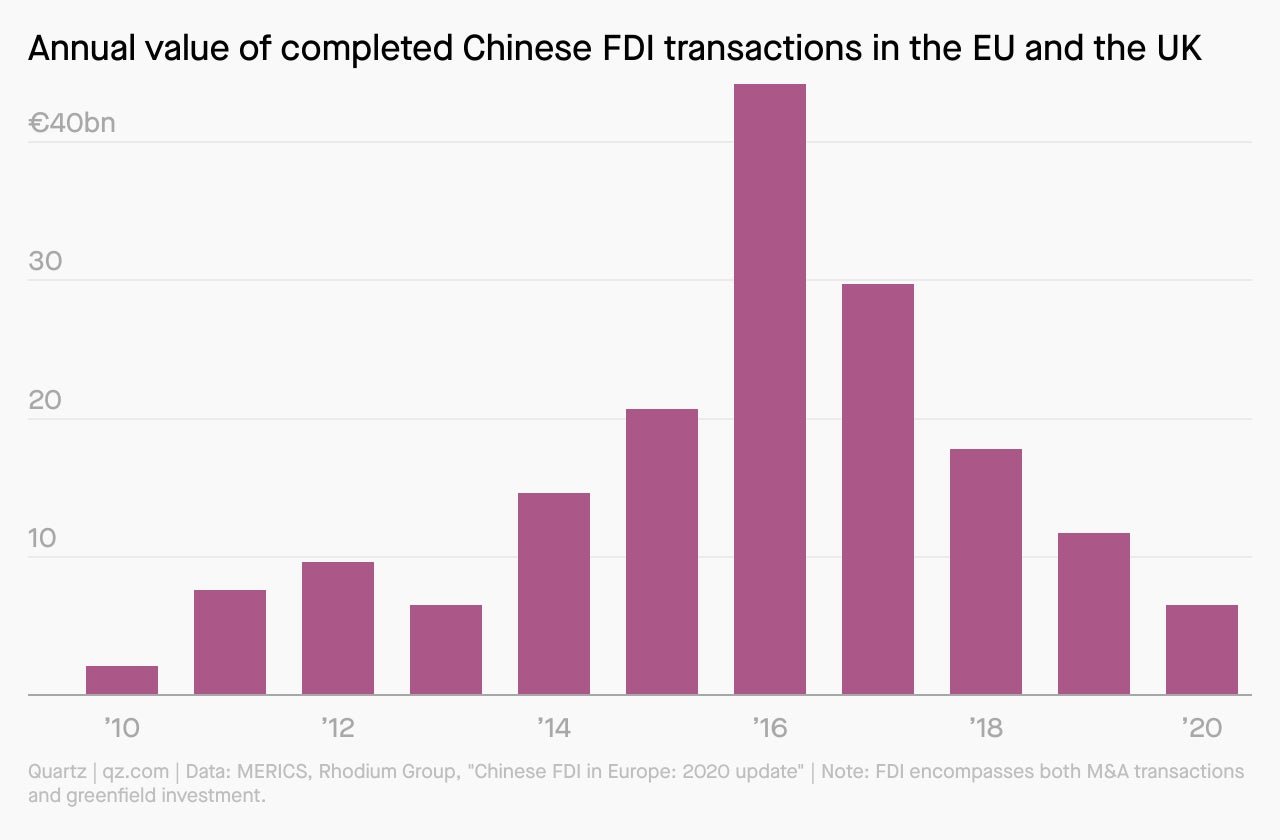Obamacare survives, China’s investment in Europe, Juneteenth
Good morning, Quartz readers!


Good morning, Quartz readers!
Was this newsletter forwarded to you? Sign up here. Pick the 13 friends you’d want to represent your brand, and forward this email to them.
Here’s what you need to know
ByteDance made $34.3 billion in 2020. Total revenue surged 111% at TikTok’s parent company last year, while gross profits jumped 93% to $19 billion, the Wall Street Journal reported.
The Affordable Care Act survived a third legal challenge The US Supreme Court told the plaintiffs—Texas and other Republican-leaning states—that they lacked the standing to bring the lawsuit at all.
Iran votes in a crucial presidential election. Several reformist candidates have already been disqualified from running, which leaves a hardline conservative named Ebrahim Raisi as the near-uncontested frontrunner.
The US is investing $3.2 billion in antiviral pills. The money will help fasttrack trials for Covid-19 drugs as well as enable research in treatments for other potentially pandemic-causing viruses.
China’s astronauts made it to the Tianhe-1 space station. Their rocket launch went off without a hitch, and the crew was able to dock and enter the core living module.
The UK also agreed to end the Airbus-Boeing dispute with the US. Similar to the US-EU deal announced earlier this week, the UK agreement shifts the focus to China.
Rolls-Royce aims to have net-zero emissions by 2050. The airplane and ship engine maker plans to increase investment in decarbonization R&D and make sure its jet engines can run on sustainable fuel.
What to watch for
The US officially observes Juneteenth on Saturday. On June 19, 1865, a general in Texas announced freedom for the last enslaved people in the US, paving the way for the eventual end of the practice in the former Confederacy later that year. Yesterday, US president Joe Biden signed into law a bill that made the day a federal holiday.
US activists have campaigned for many years to have the important anniversary commemorated. Many US companies, including Nike, JCPenney, and Target, already give their US employees a day off for Juneteenth (Quartz’s is today).
If you’d like to mark the occasion with meaningful action and reflection…
🎆 Throw a celebratory barbecue. After all, it’s really an Independence Day.
🛒 Shop at Black-owned businesses.
🎉Attend a festival or parade.
🤔Take part in whatever your employer’s planning to do to commemorate. Not sure they’re doing anything? Send them some examples of companies who are.
Charting Chinese investment in Europe
Overseas investment fell everywhere last year because of the pandemic. But the chart below shows a sustained trend of decreased interest on the part of Chinese investors in Europe, in spite of fears that European companies would be snapped up left and right at undervalued prices because of the generalized economic uncertainty tied to Covid-19.

Chinese outward investment may have slowed but China itself was the largest recipient of foreign investment in the world in 2020, according to the OECD. It was also the only major country that ended 2020 with a larger economy than when it started. And while Chinese investors are shying away from Europe, European companies are doubling down on the Chinese market and expanding their operations in China.
Celebrities are crashing the creator economy
At the end of the day, the creator economy is a direct-to-consumer business. And the tech giants aren’t really interested in handing over much of consumers’ cash to those who use their platforms to create content.
But a growing number of firms are emerging to facilitate that transaction. Substack, OnlyFans, and Patreon offer subscriptions and tiered access to convert established audiences into paying customers. Here’s a look at how they’re doing, by the digits:
10,000: Celebrity personalities Cameo added to its roster since the pandemic began
130,000: Number of Substack subscribers to the newsletter of Casey Newton, former writer for The Verge
$4 billion: Patreon’s most recent valuation
6 million: Number of paying Patreon patrons
$2 billion: Amount OnlyFans claims it made in sales last year alone
$0: Amount of outside investment OnlyFans has accepted, though it has an upcoming fundraising round
Learn more about how celebs are dipping into the influencer playbook, a playbook originally based on the celebrity hustle.
✦ Want to hear Cameo explained to you by Jon Lovitz? If you’re a Quartz member, check your inbox. Haven’t yet made the plunge? Try out a membership free for a week.
You asked about China’s vaccines
Should I be concerned about the effectiveness of China’s Covid-19 vaccines?
Adding together doses administered in China and overseas, China’s leading vaccines may be the most widely used globally. But late-stage trial results that began to trickle out last year confirmed early concerns that the protection they delivered wasn’t as good as that conferred by the Pfizer and Moderna vaccines, which use a novel mRNA approach as opposed to a neutralized version of the coronavirus itself.
“Efficacy” refers to the extent to which a vaccine reduces Covid-19 cases in a trial compared to the rate in a control group. In other words, 80% efficacy doesn’t mean 20% of the people who get the jab will get sick. It means there were 80% fewer cases in a trial compared to a control group. “Effectiveness” refers to how the vaccines hold up in real life, in conditions and among populations that often differ significantly from those in trials.
New waves of Covid-19 cases in places with a high per capita level of Sinopharm or SinoVac vaccinations have raised concerns that the vaccines have lower real-world effectiveness than officials may have been hoping. Places like Bahrain are now offering Pfizer booster shots in an attempt to reduce cases. China’s vaccination efforts at home may prove to be the true test to keep an eye on.
Handpicked Quartz
(Psst. 👇 We took the first story out from behind our paywall because you may be pondering this question yourself.)
Surprising discoveries
Coelacanths live to be 100 and their pregnancies last 5 years. The giant deepwater fish, so-called living fossils, have been around for 400 million years.
Scientists built a burrowing snake robot. Apparently the monstrosity could have uses for the military and extraterrestrial exploration.
An inmate was elected to a local government post in Washington. Joel Castón will represent a district that includes the jail where he’s been locked up for 26 years.
A new species of giant rhino was discovered in China. However, the animal was more like a tapir, and had no horn.
A YouTuber bet a physicist $10,000 he can travel faster than wind. Celebrity scientists Bill Nye and Neil deGrasse Tyson are overseeing the wager.
Correction: In yesterday’s brief, we said that Juneteenth marked the end of slavery. This has been corrected above.
Our best wishes for a productive day. Please send any news, comments, science-based wagers, and living fossils to [email protected]. Get the most out of Quartz by downloading our iOS app and becoming a member. Today’s Daily Brief was brought to you by Annabelle Timsit, Scott Nover, Tripti Lahiri, Susan Howson, Liz Webber, and Samanth Subramanian.